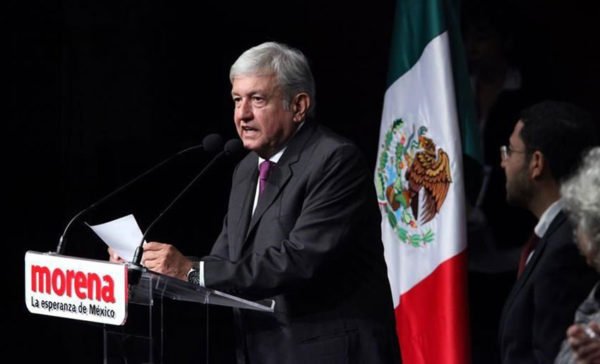Morena party chief presents platform for next year’s presidential election
Compiled by Mexico News Daily
Two-time leftist presidential candidate Andrés Manuel López Obrador has presented the political platform he hopes will pave the way to make his tilt at the top job in next year’s election a case of third time lucky.
The Morena party — which he founded and leads — held its fourth annual congress in Mexico City yesterday where the repeat aspirant, better known by his initials AMLO, set out his vision for the country in a policy manifesto entitled “National Project 2018-2024.”
The minimum wage, education, earthquake reconstruction, security, corruption, the economy and personal rights and freedoms all form part of the party’s agenda, part of which is intended to dispel concerns that the party is anti-business.
The daily minimum wage will rise by 15.6 percent per year under Morena’s proposal, ensuring that it will reach 171 pesos (US $9) by the end of 2024 and maintain pace with the minimum threshold set by the social development agency Coneval for well-being.
On education, López Obrador announced a scholarship scheme which aims to ensure that 150,000 young Mexicans — that he says are currently excluded from pursuing further studies — are able to access tertiary education. Under the proposal every student would receive 29,000 pesos (US $1,542) annually and entrance examinations would become optional to avoid students being “rejected” from educational institutions.
López Obrador also proposed that new funds for earthquake reconstruction be allocated directly to victims. Further resources would also be allocated for the reconstruction of infrastructure and the repair of culturally and historically significant heritage sites, buildings and monuments, he said.
In total, he pledged 45 billion pesos (US $2.4 billion) towards the efforts.
On security, López Obrador put forward an initiative similar to one already presented by current President Enrique Peña Nieto, who proposes creating a “Mando Único” or single command for the country’s state police forces. The proposal would effectively put an end to the independence of municipal police and is designed to create more standardized and professional forces across the country.
He also said he would withdraw the military from the nation’s streets, although he stressed it would only be done when it was safe to do so.
On corruption López Obrador proposed reforming Article 19 of the constitution to enforce mandatory preventative custody for people who commit crimes related to corruption.
“To transform this country, it’s no longer enough to complain that we have a dishonest government. We have in our hands the chance to put an end to corruption,” he said.
He also sought to allay fears that have seen him compared to the late Venezuelan president Hugo Chávez, with some critics fearing that he will implement wide reaching and radical social and economic reforms that could endanger the country’s economy.
López Obrador defended the right to private property, assuaging fears that he may seek to nationalize some assets or industries, adding that the nation’s public accounts would be managed responsibly under a government he leads.
He also said he would carry out reforms on fiscal policy without raising taxes and would reassign more than 412 billion pesos (US $21.9 billion) to invest in infrastructure projects and social programs. In total, 4.1 percent of gross domestic product would be redirected for the purpose, he said.
The candidate’s chief strategist, who also spoke at the congress, stressed that the party is not seeking to follow any precedent established by governments in other countries.
“We know very well what we want and what we don’t want. We are inspired by Mexico. Not by France, or Spain, China, the United States, Venezuela or any other country,” said Alfonso Romo, a successful businessman and agro-industrialist from Nuevo León.
López Obrador reiterated the point, attempting to dispel notions that he is anti-business.
“Let’s be clear, we’re not against business people, on the contrary, the business sector is necessary. We are against corrupt politicians, influence peddlers, things like that . . . We’re not inspired by any foreign government, not Maduro, or Donald Trump . . .” he said.
Some of the other proposals López Obrador announced yesterday were to:
• Ensure strict supervision of private companies carrying out projects with public money.
• Monitor every peso of public money online in real time.
• Abolish immunity against prosecution, known as the fuero, for the president.
• Create a national tourist police force.
• Give greater autonomy and sanction powers to the Federal Auditor’s Office (ASF).
• Reduce the size of the federal government without sacrificing quality.
• Create a special economic zone in the northern border region to stimulate economic activity.
• Build two new Pemex refineries.
• Widen broadband internet coverage to marginalized areas at accessible prices.
• Build a tourist railway on the Yucatán peninsula.
López Obrador previously contended the 2006 and 2012 presidential elections and came particularly close to victory in 2006, when he won just half a percentage point fewer votes than Felipe Calderón. He is currently the frontrunner in most polls to be Mexico’s next president.
However, neither the governing Institutional Revolutionary Party (PRI) nor the left wing-right wing coalition known as the Citizens’ Front for Mexico have yet decided who their candidates for the July 1 election will be.
Source: Reforma (sp), La Razón (sp), Animal Político (sp).



